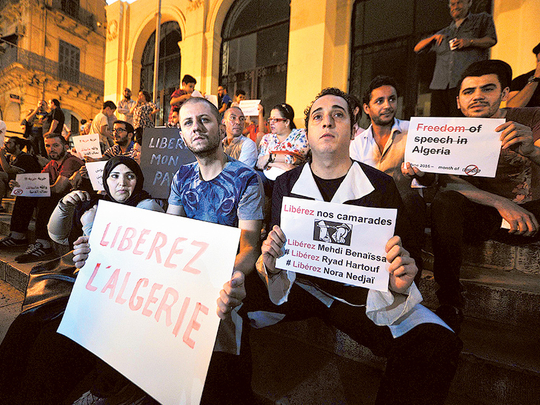
Algiers: Algeria’s independent media is noisy, unsparing and often acerbic — and authorities think that’s a problem.
Algerian officials are going after the independent media for unnecessarily “setting off alarms” and “darkening” the image of the North African country, which is struggling with lost oil revenues and political uncertainty surrounding an ailing president.
Most independent newspapers have been trying to survive for the past year deprived of ads from state-run companies and risking the loss of ads from private firms. Now, jail is a new risk.
An Algerian journalist who lives in London was arrested a week ago while visiting his homeland. Mohammad Tamalt has been detained since June 27 — even though the constitution forbids holding journalists on press-related charges. Two other journalists connected to a satirical TV show that was abruptly cancelled by the government also are being held, along with an employee of the Communications Ministry.
The independent media sprang up in the early 1990s after Algeria did away with the single-party system that ran the country since its independence from France in 1962. Today, there are some 125 independent newspapers, large and small, clamouring to be read. Among them are highly influential papers that serve as opinion-makers both within Algerian society and in the political sphere.
That media, often commenting on the government’s failure to address citizens’ needs, now feel targeted by a state growing increasingly sensitive about the image of the African continent’s largest country, which is coping with a 70 per cent drop in hydrocarbon revenues and trying to plan for a new political era.
This is not the first tug-of-war between the press and Algerian authorities, who in the past have used the withholding of advertising as pressure to curb the outspoken.
Communications Minister Hamid Girne opened another front last week, advising private advertisers not to place ads in newspapers “which want to destabilise the country to the detriment of the virtuous and professional practice of journalism.”
Judicial authorities have also stepped in.
Jailing journalists has been forbidden since 2008, but Tamalt was arrested and jailed days after arriving in Algiers. He is accused of insulting 79-year-old President Abdul Aziz Bouteflika, who is ailing and in his fourth term. Tamalt has been on a hunger strike at Al Harrash prison, according to his brother Abdul Qader Tafat. A trial has been postponed until Monday. His lawyer, Khalid Sidhoum, said the judge refused to free him.
Tamalt’s articles in the newspaper Al Siaq Al Aarabi, which appears in London, and on his Facebook page led to his arrest, according to his brother, who said that police in civilian clothes informed the family of the arrest during a visit to their home and demanded the journalist’s laptop.
Tamalt is not the only journalist to incur the wrath of officialdom.
Days earlier, Algerian authorities shut down a satirical TV show that reviewed the news with cutting smirks — sparing no one in the political hierarchy. Three people, including the producer and director of the private channel KBC that showed the nightly prime time program, were jailed June 23.
The popular show, “Ness Stah” — a reference to the thousands of young Algerians without a bed who sleep on building rooftop terraces — was shut down after one sketch centred on Bouteflika’s illness. Partially paralysed from a 2013 stroke and rarely seen by citizens, the president was portrayed in wheelchair with a nearly catatonic look.
“The suspension of this show is a message of intimidation to the media who aren’t politically correct,” said Fetta Sadat, lawyer for Mahdi Bin Eissa, the KBC channel’s director.
The Justice Ministry said the show was nixed because it was filmed in studios that are officially closed. For Sadat, that’s just “a pretext to stop a show that says with derision what all Algerians already know.”
Sensitivity over Bouteflika’s highly controlled image threatened a diplomatic incident with former colonial ruler France after French Prime Minister Manuel Valls, visiting Algiers in April, tweeted an unbecoming photo of the president following their meeting.












